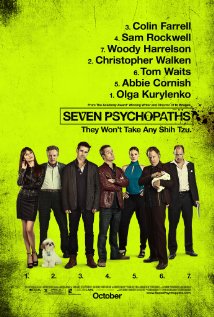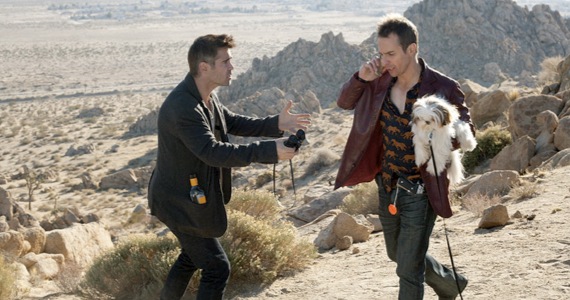Directed by Martin McDonagh
Written by Martin McDonagh
USA and United Kingdom, 2012
Christopher Walken has become a gag in modern popular culture, a punchline to a joke no one’s actually told. His repeated hosting gigs on Saturday Night Live over the past two decades along with a series of bizarre appearances in various films and music videos have cemented Walken as a kook worth mocking. So we forget or don’t realize that before Walken asked for more cowbell, he was a damn fine actor. Quirky, sure, but he used that as a secret weapon, deploying that peculiarity to set others at ease. As such, his supporting role in Martin McDonagh’s outrageous, clever, and bloody new film Seven Psychopaths is a bit of a revelation, brimming with honesty, emotion, and wit. The rest of the film rarely reaches Walken’s level of acting prowess, but is still enjoyably daffy.
Colin Farrell stars as Martin, an Irish screenwriter struggling to finish his latest project, called…Seven Psychopaths. (It will not shock you to learn that McDonagh a) wrote the film and b) is Irish.) He’s constantly being encouraged to channel his real life into his fictional work by his fast-talking actor friend Billy (Sam Rockwell), who also kidnaps dogs to supplant his low income. Billy’s accomplice is Hans (Walken), an older gentleman with a dark past. When Billy and Hans kidnap the dog of a vicious and temperamental mobster (Woody Harrelson) and get Martin involved, they’re soon on the run, all while trying to help Martin finish his script.
McDonagh’s screenplay is frequently very funny, a winking parody of how mindless shoot-‘em-up action films are created, depicting the push-and-pull struggle between art and commerce. Martin desperately wants to write a film about the eponymous seven psychopaths, but he doesn’t want said film to glorify violence or, really, have much in the way of blood and guts. He craves profound meaning in his storytelling, even though he can’t come up with it himself, relying on others to give him ideas. Billy is the yang to his yin, nearly salivating at the prospect of gunplay, fake or real. His lengthy description of an ideal Hollywood ending halfway through the film is both hilarious and disturbingly close to what we often get with modern-day explosive movies. Seven Psychopaths rarely stops being witty, and is sometimes able to whip from dark comedy to plain darkness. However, with so many frequent tone shifts, McDonagh can’t harness the film entirely. Some of his more curious meanderings, such as a sequence involving an ex-Viet Cong soldier, don’t seem to go anywhere. These scenes are still well-made, but feel too disconnected from the overall narrative.
He’s, of course, helped out by an excellent cast. Farrell has tried, for a decade, to bridge the gap between being a taciturn leading man and a more idiosyncratic character actor. Though he has movie-star looks, Farrell shines in off-kilter roles. He doesn’t reach the same highs here as he did in McDonagh’s last film, In Bruges, but Martin’s blend of bewilderment and being drunk is strangely endearing. Rockwell is, as ever, a delight, playing a twisted version of an extremely dedicated genre-film buff. Billy’s demands that the real-life conflict he’s entrenched in matches a clichéd movie version he’s concocted in his mind toe the line between humor and horror. Few actors are more equipped to balance those two mentalities easily; Rockwell’s more than able to play the live wire, a bundle of exposed nerves. Harrelson, once a lovable dimwit on Cheers, has carved out a niche for himself as a fierce, smart performer. As Charlie, the profane gangster whose devotion to his Shih Tzu is unparalleled, he elevates the tension in each scene, comic and otherwise.
Nevertheless, Walken is the absolute standout in Seven Psychopaths, radiating with warmth and pain, often at the same time. Hans is somewhat of a pious man, a survivor whose world-weariness is etched in the lines on his weathered face. Walken is more soulful than you might expect here, delivering what feels like an extremely personal performance from his first scene. If there’s any character who hits hardest, who connects with the audience most, it’s Hans. The way McDonagh’s initially depicts Hans is silly, inherently seeming like a role where the joke is “Look at Christopher Walken just being Christopher Walken!” But every affectation, from Hans’ predilection for cravats to his manner of speaking, pays off with powerful effect.
Martin McDonagh’s a very clever writer, no doubt. At his best, he writes a mean mix of extreme black comedy, violence, and pathos, as evidenced in the 2008 film In Bruges. For his follow-up, he’s brought together a powerhouse ensemble; even better, he knows their strengths as performers and writes to those effectively. Seven Psychopaths, with Woody Harrelson, Colin Farrell, Sam Rockwell, and Christopher Walken spouting his hyper-intelligent, hyperactive, and expletive-laden dialogue, couldn’t really be a bad film. And because such films are few and far between, any attempt at analyzing the frustrations and follies of screenwriting would make for an entertaining diversion. What stops Seven Psychopaths from being truly brilliant is that McDonagh can’t marry the meta aspect with the somewhat straightforward crime picture at the core of this story. Parts of Seven Psychopaths are nearly transcendent, filled with unexpected power. The whole is merely satisfying.
— Josh Spiegel





